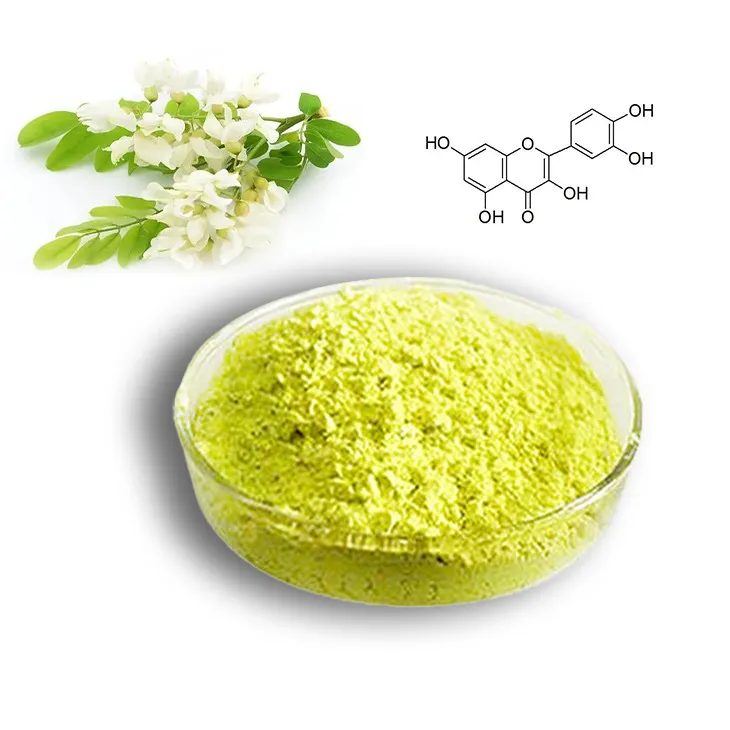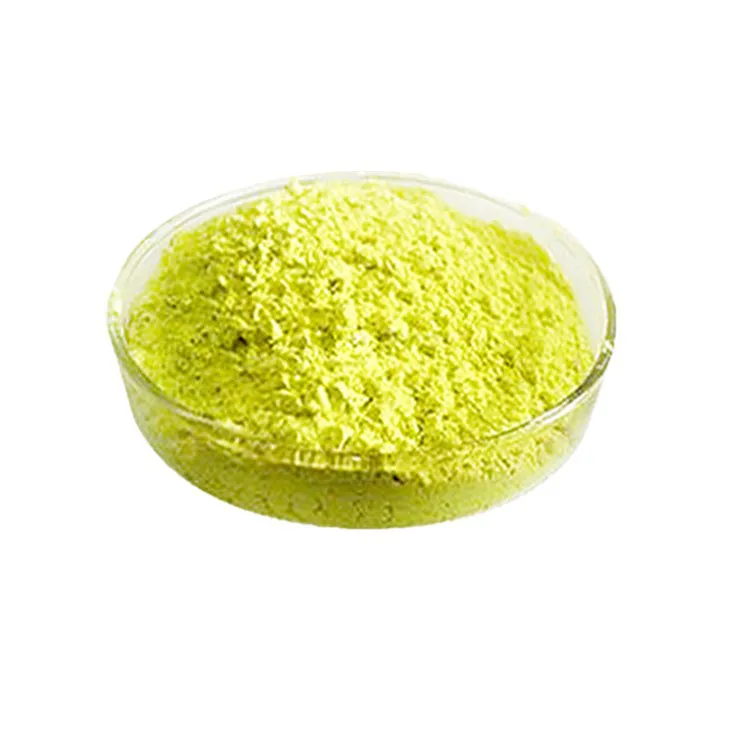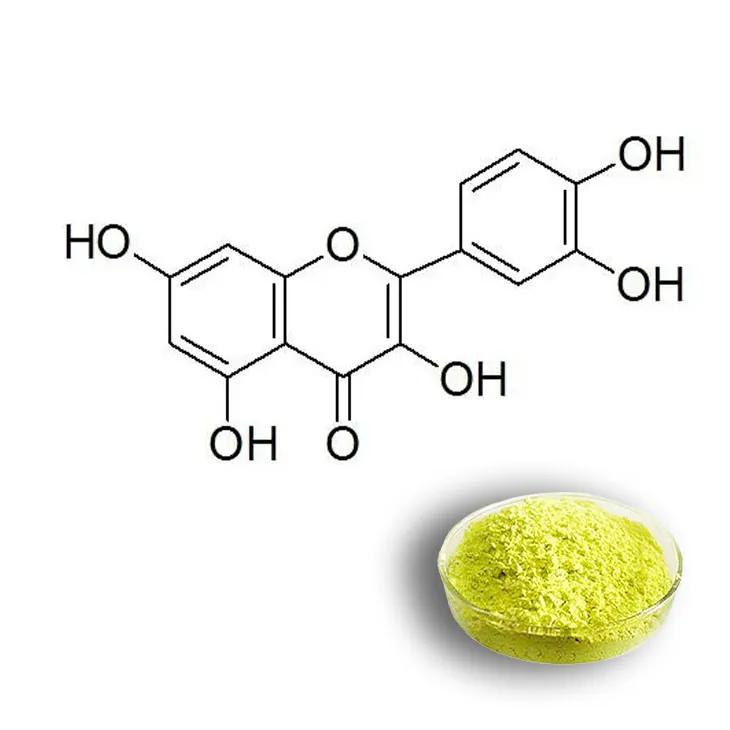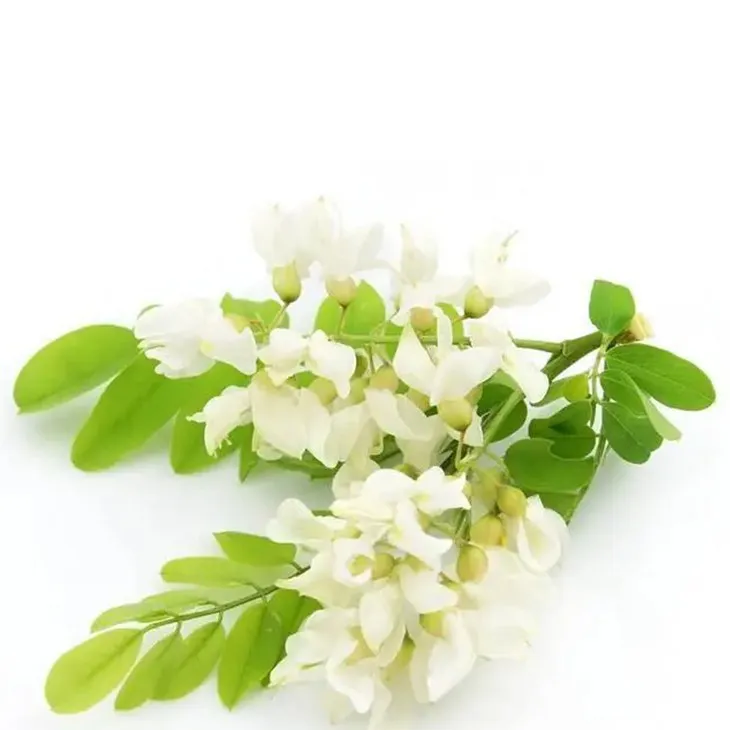- 0086-571-85302990
- sales@greenskybio.com
What is quercetin and why use it on the skin?
2024-11-12

1. Introduction to Quercetin
Quercetin is a natural compound that belongs to the flavonoid family. It is found abundantly in various plants such as onions, apples, berries, and tea. Flavonoids are known for their diverse biological activities, and Quercetin is no exception. It has been the subject of numerous scientific studies due to its potential health - promoting properties.

2. Antioxidant Properties of Quercetin on the Skin
2.1. Understanding Oxidative Stress on the Skin
The skin is constantly exposed to environmental factors that can lead to oxidative stress. These factors include ultraviolet (UV) radiation from the sun, pollution, and chemicals. Oxidative stress occurs when there is an imbalance between the production of reactive oxygen species (ROS) and the body's antioxidant defense mechanisms. ROS can damage skin cells by attacking their membranes, proteins, and DNA.2.2. How Quercetin Fights Oxidative Stress
Quercetin has antioxidant capabilities that are highly effective in combating oxidative stress on the skin. It acts as a scavenger of free radicals, which are highly reactive molecules that contribute to oxidative stress. By neutralizing these free radicals, quercetin helps to prevent damage to skin cells. This not only protects the skin from premature aging, which is often associated with oxidative damage, but also maintains the overall health and integrity of the skin.2.3. The Role in Skin Cell Repair
In addition to protecting skin cells from damage, quercetin also aids in the repair process of damaged cells. When skin cells are damaged, they need to be repaired in order to function properly. Quercetin can stimulate the production of certain proteins and enzymes that are involved in the repair process. This helps to accelerate the healing of damaged skin, whether it is due to minor cuts, burns, or other forms of injury.
3. Anti - Inflammatory Effects of Quercetin on Skin
3.1. Inflammatory Skin Disorders
Many skin problems are associated with inflammation. Conditions such as acne, eczema, and psoriasis are characterized by an overactive immune response in the skin, leading to redness, swelling, itching, and pain. Inflammatory skin disorders can have a significant impact on a person's quality of life and self - esteem.3.2. How Quercetin Modulates the Immune Response
Quercetin has significant anti - inflammatory effects on the skin. It can modulate the body's immune response at the skin level. Quercetin works by inhibiting the production of certain inflammatory mediators such as cytokines and prostaglandins. These mediators are responsible for triggering and maintaining the inflammatory response in the skin. By reducing their production, quercetin helps to calm down the inflammation and relieve the symptoms associated with inflammatory skin disorders.
4. Quercetin and Melanin Production
4.1. Melanin and Skin Pigmentation
Melanin is the pigment that gives color to the skin. It is produced by special cells called melanocytes. The amount of melanin in the skin determines a person's skin color. However, problems can occur when there is an overproduction or uneven distribution of melanin. Hyperpigmentation is a common skin issue where there is an excessive production of melanin in certain areas of the skin, resulting in dark spots or patches.4.2. Quercetin's Inhibitory Effect on Melanin Production
Quercetin has been studied for its potential to inhibit melanin production to some extent. It can interfere with the enzymatic processes involved in melanin synthesis. By doing so, it could be useful in treating hyperpigmentation issues. This property of quercetin also makes it a potential candidate for promoting an even skin tone. However, more research is needed to fully understand the mechanisms involved and to develop effective skincare products based on quercetin's anti - melanin properties.
5. Incorporating Quercetin into Skincare
5.1. Sources of Quercetin for Skincare
There are several ways to incorporate quercetin into skincare. One option is to use skincare products that contain quercetin as an active ingredient. These products can include creams, serums, and lotions. Another option is to use natural sources of quercetin directly on the skin. For example, a paste made from mashed berries or a tea bag soaked in water can be applied to the skin. However, it is important to note that when using natural sources, there may be variability in the concentration of quercetin and potential interactions with other substances.5.2. Considerations for Using Quercetin - based Skincare Products
When using quercetin - based skincare products, there are several considerations. First, it is important to choose products from reliable manufacturers to ensure the quality and safety of the product. Second, some people may be allergic to quercetin or other ingredients in the product, so a patch test should be done before using it on a large area of the skin. Third, the effectiveness of quercetin - based products may vary depending on individual skin types and conditions. Therefore, it may take some time to observe the desired results.6. Conclusion
Quercetin is a flavonoid with remarkable properties that make it beneficial for the skin. Its antioxidant capabilities help to protect the skin from oxidative stress and aid in cell repair. The anti - inflammatory effects can address various skin disorders, and its potential to inhibit melanin production offers hope for treating hyperpigmentation. Incorporating quercetin into skincare, whether through commercial products or natural sources, can be a promising approach for maintaining healthy and beautiful skin. However, further research is still needed to fully explore its potential and optimize its use in skincare.
FAQ:
What are the main benefits of quercetin for the skin?
Quercetin has several main benefits for the skin. Firstly, its antioxidant properties are very strong, protecting skin cells from damage caused by oxidative stress and helping in the repair of damaged cells. Secondly, it has anti - inflammatory effects, which can deal with inflammatory skin problems by regulating the body's immune response on the skin. Additionally, it may inhibit melanin production to a certain extent, which is helpful for treating hyperpigmentation and achieving an even skin tone.
How does quercetin combat oxidative stress on the skin?
Quercetin combats oxidative stress on the skin through its antioxidant capabilities. Oxidative stress occurs when there is an imbalance between free radicals and antioxidants in the body. Quercetin, as a powerful antioxidant, can neutralize free radicals, which are unstable molecules that can damage skin cells. By doing so, it helps to prevent cell damage and supports the overall health of the skin.
Can quercetin really treat inflammatory skin disorders?
Quercetin has the potential to treat inflammatory skin disorders. It exerts its anti - inflammatory effects by modulating the body's immune response at the skin level. However, it should be noted that while research shows promise, it may not be a sole solution for all inflammatory skin conditions. In some cases, it may be used in combination with other treatments, and more research is still needed to fully understand its effectiveness and optimal usage in treating various skin disorders.
How does quercetin inhibit melanin production?
The exact mechanism by which quercetin inhibits melanin production is still being studied. However, it is believed that quercetin may interact with certain enzymes or cellular pathways involved in melanin synthesis. By interfering with these processes, it can potentially reduce the amount of melanin produced, which could be beneficial for issues related to hyperpigmentation.
Is quercetin safe to use on the skin?
Generally, quercetin is considered safe for topical use on the skin for most people. However, as with any substance, some individuals may experience allergic reactions or sensitivities. It is advisable to do a patch test before using products containing quercetin on a larger area of the skin. Also, if a person has pre - existing skin conditions or is taking other medications, it is best to consult a dermatologist or a healthcare provider before using quercetin - based skin products.
Related literature
- The Role of Quercetin in Skin Health: A Comprehensive Review"
- "Quercetin: Antioxidant and Anti - Inflammatory Properties for Skin Applications"
- "Investigating the Effects of Quercetin on Melanin Production in Skin Cells"
- ▶ Hesperidin
- ▶ citrus bioflavonoids
- ▶ plant extract
- ▶ lycopene
- ▶ Diosmin
- ▶ Grape seed extract
- ▶ Sea buckthorn Juice Powder
- ▶ Beetroot powder
- ▶ Hops Extract
- ▶ Artichoke Extract
- ▶ Reishi mushroom extract
- ▶ Astaxanthin
- ▶ Green Tea Extract
- ▶ Curcumin Extract
- ▶ Horse Chestnut Extract
- ▶ Other Problems
- ▶ Boswellia Serrata Extract
- ▶ Resveratrol Extract
- ▶ Marigold Extract
- ▶ Grape Leaf Extract
- ▶ blog3
- ▶ blog4
- ▶ blog5
-
Organic Tongkat Ali extract powder factory.
2024-11-12
-
How to make powder with ashwagandha extract.
2024-11-12
-
Rosehip extract manufacturers from China.
2024-11-12
-
The best cat's claw extract in nature.
2024-11-12
-
Chinese Dandelion Leaf Extract Suppliers.
2024-11-12
-
Horse Chestnut Extract
2024-11-12
-
Hedyotis Diffusa Extract
2024-11-12
-
Citrus Aurantii Extract
2024-11-12
-
Hesperidin
2024-11-12
-
Mulberry leaf Extract
2024-11-12
-
Curcumin Extract
2024-11-12
-
Jujube Extract
2024-11-12
-
Resveratrol extract
2024-11-12
-
Nettle Root Extract
2024-11-12
-
Marigold Extract
2024-11-12





















